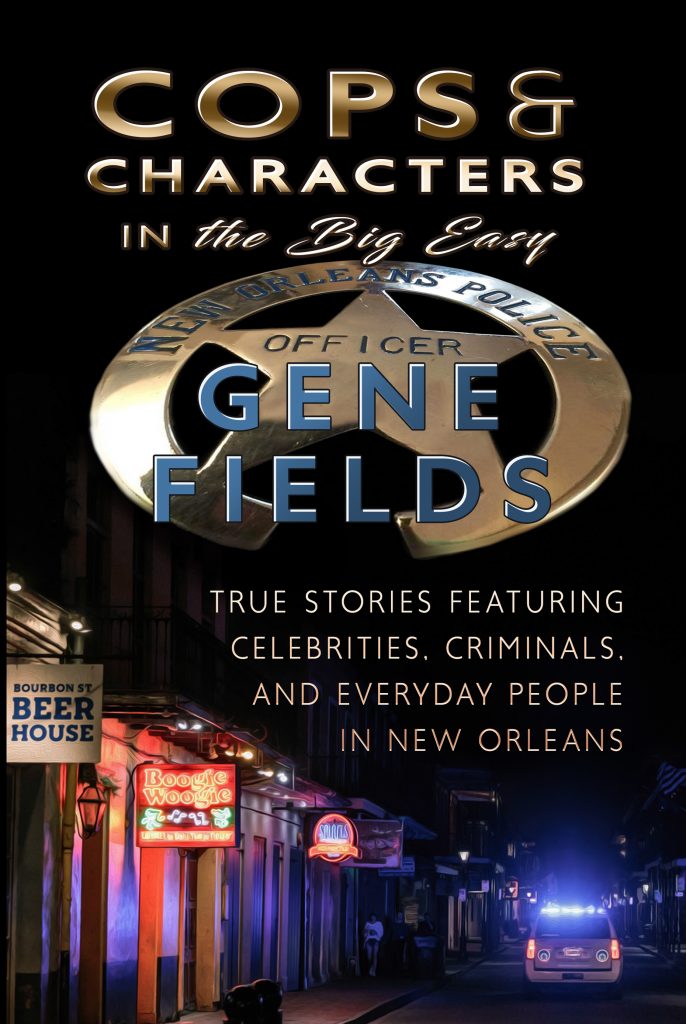Retired chief recounts cops, characters, crimes
Researching and writing about crime in South Louisiana, I have befriended numerous retired police officers. I can sit for hours listening to their adventures and misadventures. One such officer is Chief Eugene Fields, who retired from both the New Orleans Police Department and the Jefferson Parish Sheriff’s Office. Gene is the author of “Cops and Characters in the Big Easy: True Stories Involving Celebrities, Criminals and Everyday People,” a book released this month by Bogart Books.
Gene filled his book with serious and amusing recollections of life inside law enforcement—and he included photos from his 30 years serving the city. In his career, Gene encountered cold-blooded killers and comical entertainers. One chapter will have you on the edge of your seat, unable to put the book down, while the next makes you laugh or cry. If you love local crime history and want the inside scoop on how police brought down the Howard-Johnson sniper or the Dixie Mafia, this book is for you.

With Gene’s permission, here is a sample story from the book:
In the late 1970s, NOPD issued hand-held Motorola radios to all personnel for the first time. A week later, a First District patrolman finished an assignment on Dauphine Street and returned to his police unit. He placed the radio on top of the patrol car and drove off. After driving a few blocks, he realized his mistake and circled back, but failed to find the radio.
That afternoon, the Chief of Detectives got a call from the district commander, requesting that all detectives contact their informants, seeking help to find the missing equipment. My team joined others in the French Quarter to help locate the radio.
The next morning, my secretary told me someone on the phone used the name Captain Bligh and wanted to talk to me about something important. Captain Bligh was the codename singer Frankie Ford used whenever he left a message. He said the name reminded him of his hit song, Sea Cruise.
I answered the phone, and Frankie said, “Hey Geno, is there a reward for recovering that missing police radio?” I told him there might be.
He asked if I knew Tinker Bell, a gay Lucky Dog vendor that worked the corner of St. Peter and Bourbon Streets. I told him I did, and he said, “Go see him. Tell him I sent you, and he will tell you who has the radio.”
Detective Fred Williams and I located Tinker Bell. He said he had gone to an apartment on Toulouse Street to see a friend named Jewel. Jewel shared the apartment with the star attraction at the 500 Club on Bourbon Street—a dancer named Sandra Sexton. Tinker Bell said that while Jewel was inside, Sandra sat on the couch listening to calls from a small black police radio.
With his information, we got a search warrant, and along with Detectives Joe Liemann and Craig Jennings, we executed the warrant that afternoon.
We knocked on the door and Jewel answered. I asked him if Sandra was home and he said yes; she was in her bedroom.

We opened the bedroom door and discovered an NOPD officer. His gun belt lay on the bed with his pants and underwear piled around his ankles. He stood next to the bed with Sandra, stark naked, on her knees in front of him. On the nightstand, the missing Motorola police radio squawked a signal 108—Officer needs assistance.
After the stripper and the patrolman dressed, Sandra said Jewel found the radio lying in the street and brought it to the apartment. We arrested both Sandra and Jewel for possession of the stolen radio, and we delivered the device and the police officer to the First District.
In the captain’s office, I said, “Sir, I have good news and bad news. We found your missing radio, but you are going to lose an officer.” I told him the officer’s name, and he said the officer was on probation, three weeks out of the Police Academy. The captain called the patrolman into his office, and he admitted to seeing the radio and doing nothing.
They terminated the officer, not for having sex on duty, but for abandoning his post to enter the apartment instead of walking his beat.
The next day, I called Frankie Ford back and told him what happened. He laughed and suggested I buy him a steak dinner for his help. When I told Chief Henry Morris, the chief told me to bring back the receipt and he would approve my reimbursement.
Later that week I took Frankie to the Steak Pit on Bourbon Street. Todd, the owner, knew us both and comped the meal, but I left the waiter a $10 gratuity. Chief Morris reimbursed me for the tip.
Beginning at three, Friday afternoon, I will join Gene Fields for a book signing in the Quarter View Restaurant on the Clearview Parkway in Metairie. In his company will be a host of other storytellers, retired cops, characters, celebrities, and maybe a reformed criminal or two. If you like great crime stories, please make plans to attend.

